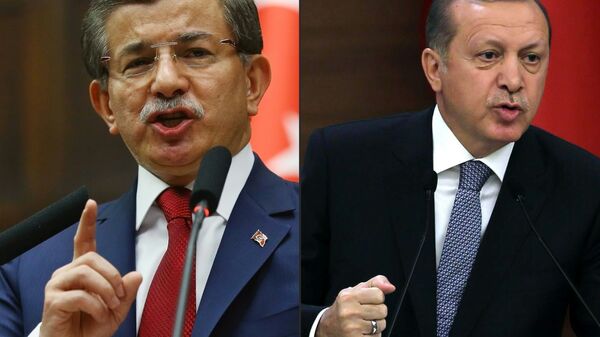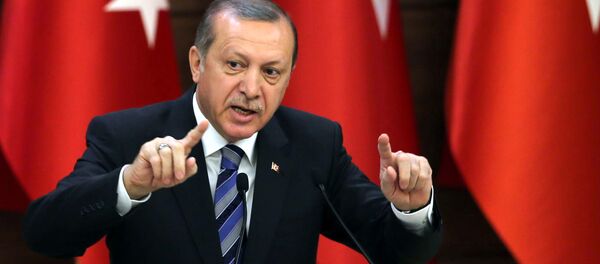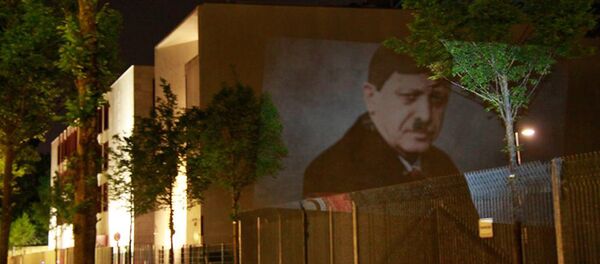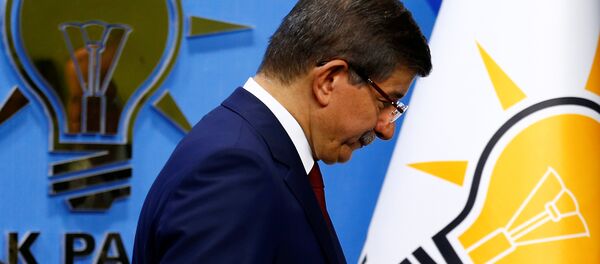“For the first time in Turkey’s history the Prime Minister resigned not due to the collapse of the coalition or a vote of no confidence, but due to internal disputes within the ruling party,” the geopolitical analyst writes in his article for the New Eastern Outlook website.
“For the first time since the days of Ataturk the president is deciding who is going to head the Turkish cabinet. Regardless of who is going to occupy this position, the actual head of the government is and will be President Erdogan, who has been pursuing such power for years,” he adds.
The author then examines the personality of President Erdogan and his relationship with the former prime minister.
“Erdogan was carefully and zealously tracking all the steps that Davutoglu was making, along his contacts with Chancellor Merkel and other EU representatives. In the meantime, he tried to find a replacement that would cement his plans to change the constitution and enable the transition of Turkey into a presidential republic,” he says.
Martin Berger even refers to the words of the German journalist and publisher Ulrich Kienzle, who recently described Erdogan as a “nutcase”.
Berger then compares the two politicians: “unlike Erdogan, who grew up in Istanbul’s slums, and learned to claw his way up by trickery and deceit, Davutoglu grew up in a well-educated family. Over the years he has been employed by the department of international relations at the University of Marmara, and was a visiting professor at Turkish military academies. In 2003 he was presented with the rank of Ambassador Extraordinary and Plenipotentiary.”
As for Erdogan, ever since the day he became the Turkish president, he has not made it a secret that he wanted to grab all the power in the country and has been pushing for a new draft of the constitution which would transform Turkey into a presidential republic from a parliamentary one which it currently is.
In his further analysis of possible political developments in Turkey, Berger notes that Davutoglu, who is more of an “intellectual character than a street fighter”, could directly confront Erdogan, but only if he has the support of the West.
“After all, Washington and Brussels have nothing to gain from the rebellious madman holding the position of Turkish president, a position that is becoming stronger by the day.”
Davutoglu, in comparison, is considerably more humble, not interested in making a cult out of his personality, and he’s always willing to negotiate, he reasons.
“That is why Western leaders are sympathetic with Davutoglu. One shouldn’t forget that during their visit to Turkey, German Chancellor Angela Merkel and the President of the European Council Donald Tusk met with the Prime Minister, not the President. Hillary Clinton also strongly supported Davutoglu and she’s going to visit Turkey soon.”
In addition, the resignation of Ahmet Davutoglu jeopardizes the implementation of the migration agreement between Brussels and Ankara, the author adds.
But sympathy – is one thing, and the actual political support – quite another.
“Turkey is being plunged into political chaos, with the ruling AKP finding itself opposed by both the army and the political opposition, along with 22 million Kurds led by the banned Kurdistan Workers Party (PKK),” the geopolitical analyst says.
In this case, civil conflict could result in the collapse of the Turkish state with the Kurdish areas (the entire South-East Anatolia) breaking away, seeking ways to create an independent Kurdistan that will absorb certain areas in Syria and Iraq, changing the whole balance of power in the Middle East, the author suggests.
“In any case, Erdogan’s stubbornness, inability to respect other human beings, dictatorial ambitions and links with Daesh bring Turkey to the brink of political chaos,” he says.
“And he’ll have to answer for this sooner or later,” the author therefore concludes.






